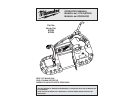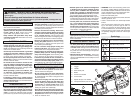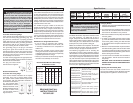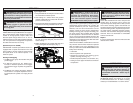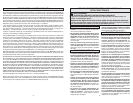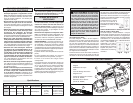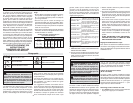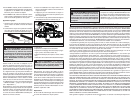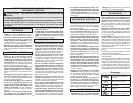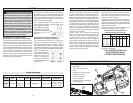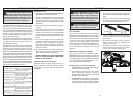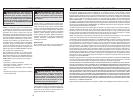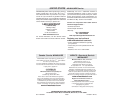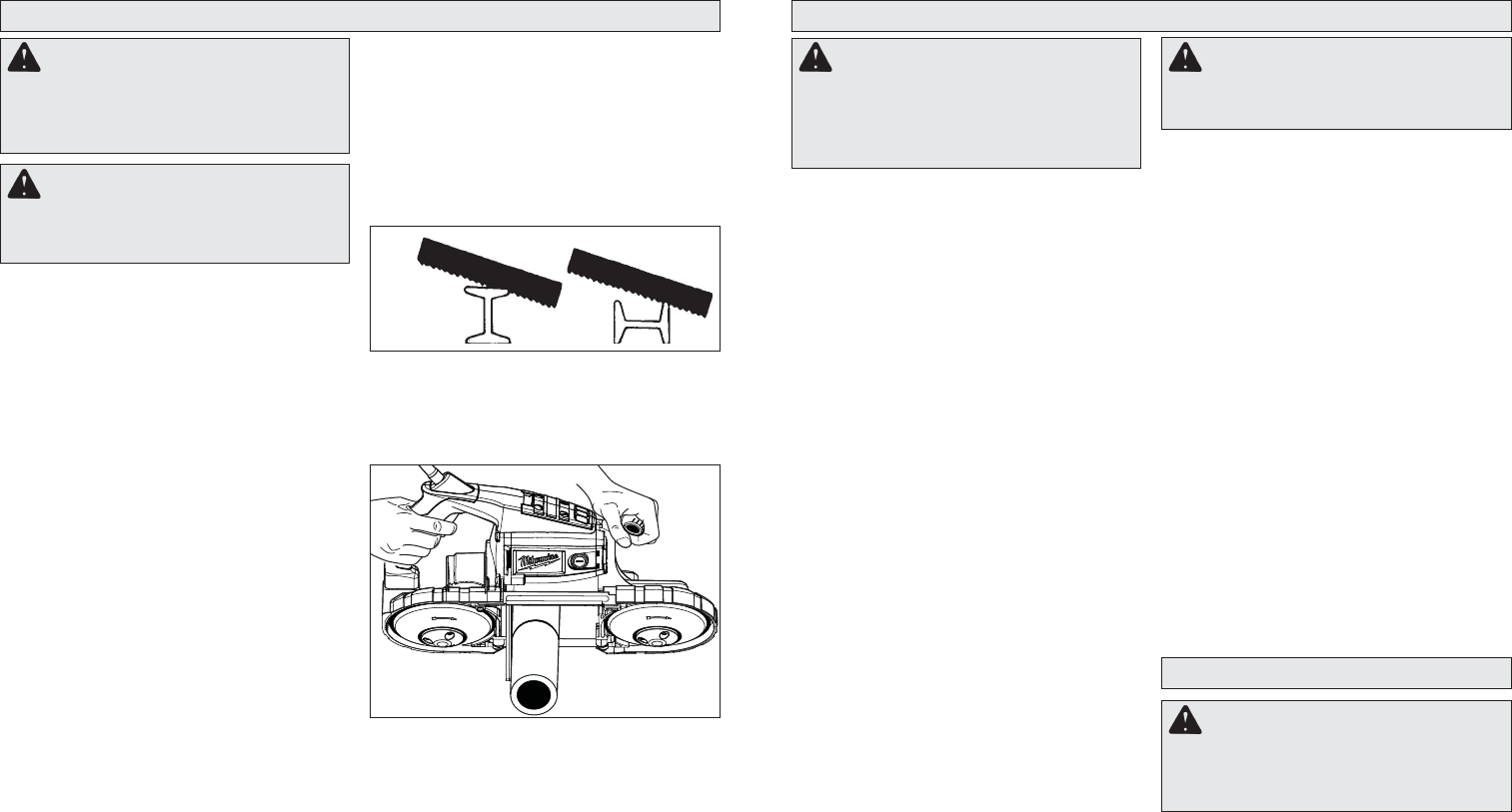
6
7
OPERATION
WARNING To reduce the risk of injury,
wear safety goggles or glasses with side
shields. Keep hands away from the bit and
all moving parts.
WARNING To reduce the risk of injury,
always unplug tool before attaching or remov-
ing accessories or making adjustments. Use
only specifi cally recommended accessories.
Others may be hazardous.
Two Speed Switch (Cat. No. 6236N)
MILWAUKEE Two-Speed Band Saws are equipped
with a speed change switch located on top of the
handle. To change speeds, stop the motor and
slide the speed change switch to "HI" or "LO" as
indicated on the tool. For cutting problem materials,
use "LO" speed. Never change from one speed to
the other while the motor is running.
Speed Dial (Cat. No. 6230N)
MILWAUKEE Variable Speed Band Saws are
equipped with a speed dial located on the side
of the handle to set the maximum speed. Rotate
the speed dial to “5” for maximum speed, “1” for
minimum speed.
Starting and Stopping
1. To start the tool, grasp the handles fi rmly and
pull the trigger.
2. To vary the speed (Cat. No. 6230N only),
increase or decrease pressure on the trigger.
The further the trigger is pulled, the greater the
speed.
3. To stop the tool, release the trigger. Allow the
tool to come to a complete stop before remov-
ing the blade from a partial cut or laying the tool
down.
Fig. 2
Correct Incorrect
Fig. 3
4. Do not bear down while cutting. The weight of
the tool will supply adequate pressure for the
fastest cutting.
5. When completing a cut, hold the tool fi rmly so it
will not fall against the workpiece (Fig. 3).
Typical Application
1. Keep the blade off the workpiece until the motor
has reached the selected speed.
2. Start cutting on a surface where the greatest
number of teeth will be in contact with the work-
piece at one time (Fig 2).
3. Place the work steady rest against the workpiece
and lower the moving saw blade into the cut.
MAINTENANCE
Cleaning
Clean dust and debris from vents. Keep the tool
handles clean, dry and free of oil or grease. Use
only mild soap and a damp cloth to clean your tool
since certain cleaning agents and solvents are
harmful to plastics and other insulated parts. Some
of these include: gasoline, turpentine, lacquer thin-
ner, paint thinner, chlorinated cleaning solvents,
ammonia and household detergents containing
ammonia. Never use fl ammable or combustible
solvents around tools.
Repairs
If your tool is damaged, return the entire tool to the
nearest service center.
WARNING To reduce the risk of
injury, always unplug your tool before
performing any maintenance. Never disas-
semble the tool or try to do any rewiring
on the tool’s electrical system. Contact a
MILWAUKEE service facility for ALL repairs.
WARNING To reduce the risk of injury,
electric shock and damage to the tool, never
immerse your tool in liquid or allow a liquid
to fl ow inside the tool.
Maintaining Tools
Keep your tool in good repair by adopting a regular
maintenance program. Before use, examine the
general condition of your tool. Inspect guards,
switches, tool cord set and extension cord for
damage. Check for loose screws, misalignment,
binding of moving parts, improper mounting, bro-
ken parts and any other condition that may affect
its safe operation. If abnormal noise or vibration
occurs, turn the tool off immediately and have the
problem corrected before further use. Do not use a
damaged tool. Tag damaged tools “DO NOT USE”
until repaired (see “Repairs”).
Under normal conditions, relubrication is not neces-
sary until the motor brushes need to be replaced.
After six months to one year, depending on use,
return your tool to the nearest MILWAUKEE service
facility for the following:
• Lubrication
• Brush inspection and replacement
• Mechanical inspection and cleaning (gears,
spindles, bearings, housing, etc.)
• Electrical inspection (switch, cord, armature, etc.)
• Testing to assure proper mechanical and electri-
cal operation
ACCESSORIES
For a complete listing of accessories refer to your
MILWAUKEE Electric Tool catalog or go on-line
to www.milwaukeetool.com. To obtain a catalog,
contact your local distributor or a service center.
WARNING To reduce the risk of injury,
always unplug the tool before attaching or
removing accessories. Use only specifi cally
recommended accessories. Others may be
hazardous.



